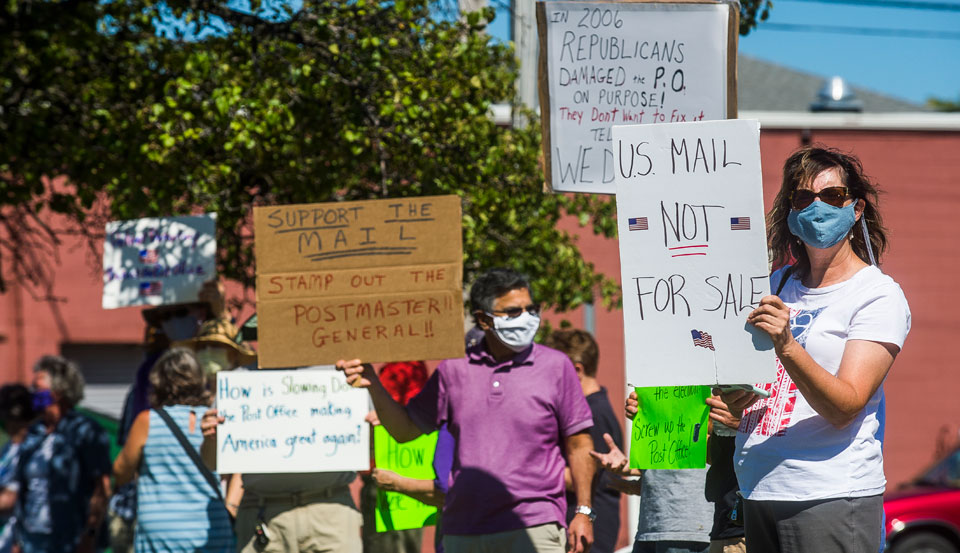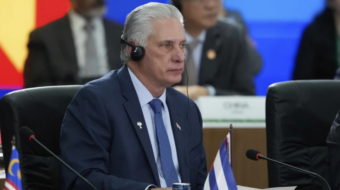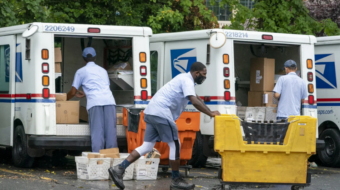
WASHINGTON—Donald Trump’s hand-picked Postmaster General, Louis DeJoy, claims he has backed down, for now, from his plan to wreck voting by mail. Nancy Pelosi wants to ensure he stays down and that he fixes the damage already done. And U.S. Postal Service unions and their supporters plan to hit the streets, twice, to hold him to his promise.
In sum, that’s what happened, all on August 18, in the ongoing war pitting the Trump regime and his GOP big giver PMG DeJoy on one side and the Democratic House Speaker, her lawmakers, postal workers, their unions and the rest of the country on the other.
The next key joust is a House vote on August 22 to stop DeJoy’s moves, the day of 11 a.m. mass protests planned at post offices nationwide.
All this action occurred simultaneously with the zoom-voting Democratic National Convention, whose delegates formally nominated Joe Biden to run for president against GOP incumbent Trump.
“To avoid even the appearance of any impact on election mail, I am suspending these initiatives until after the election is concluded,” DeJoy said in a statement and a letter to House Oversight Committee Chairwoman Carolyn Maloney, D-N.Y. But he didn’t promise to put back the sorting machines he’s already yanked or reverse his other moves to slow down the mail.
DeJoy’s moves are seen as an obvious attempt to stop vote-by-mail, which his sponsor, Trump, and other GOP ideologues fear would doom their election chances this fall. Trump has lied that voting by mail produces fraud. Voting by mail lets everyone, especially women, workers, unionists, people of color, and other foes of the corporate and right-wing agenda easily cast ballots.
When people vote by mail, turnout skyrockets. The woman who cast Utah’s votes for Biden noted her totally vote-by-mail state had an 80% turnout in 2016. She expects that to go up. And that’s in a deep-red state.
All of this still doesn’t stop Trump’s real goal, aligned with right-wing ideologues in and out of his White House, to privatize and corporatize the Postal Service, hand over profitable routes to “the private sector,” fire its workers, curb deliveries, cut off rural areas and trash the union contracts that cover its 604,000 workers. Its workforce is 40% people of color, heavily female, and one-sixth veterans.
Public pressure in a flood of e-mails, phone calls, and uproar forced DeJoy, a former corporate mogul and donor of more than $1 million to Republican committees and candidates, including $16,000 to Trump starting in 2016, to suspend his schemes to make the deficit-wracked USPS more “efficient.”
His moves include a ban on overtime, thus slowing deliveries and forcing Postal Workers and Letter Carriers to leave piles of mail on trucking dock floors. DeJoy started removing 671 high-speed sorting machines designed to scan large, flat envelopes, targeting those containing absentee ballots. He didn’t promise to put the machines back.
And DeJoy yanked hundreds of the USPS’s ubiquitous blue mailboxes off the streets, removing those he claimed received few letters. They also just happened to be in central cities and other areas with concentrations of people of color and Democratic voters.
In his letter to Maloney, DeJoy promised to suspend all those actions, but only through the election. Maloney and Pelosi don’t trust him, though.
So the same day, they filed legislation, HR8015, to write that suspension into law and to roll back all other USPS cuts since Jan. 1. The rollback would extend through January 1 or the end of the coronavirus pandemic emergency, whichever is later, the bill says.
The Delivering For America Act also would send the USPS the $25 billion it says it needs to get through the end of the year and make up for the drastic drop in its money-making first-class mail volume, due to closures needed to combat community spread of the virus.
“It should not have taken the Postmaster General this long to recognize his actions were causing major delays in rural and urban communities, and among veterans, seniors, and families across the country,” Maloney replied to DeJoy in a statement. “His announcement is certainly necessary, but it is inadequate to remedy the damage already done and ensure ballots will be delivered on time this November.”
“I can think of no worse time than in the middle of a national health emergency and less than 90 days before an election to implement these changes,” Maloney told an August 18 rally, with postal unions, in front of the post office at New York’s Union Square.
Ironically, Maloney’s own primary in New York City’s “silk stocking” congressional district exposed one big problem with vote-by-mail. The tsunami of absentee ballots, far above 50% of the total, overwhelmed the city board of elections.
It took more than three weeks, due to distancing and handling restrictions the pandemic imposed, to count the ballots and give her a narrow win over a challenger. The board also threw out thousands of ballots, mostly from Black and brown voters, because of picky errors.
DeJoy also agreed to testify to Maloney’s panel on August 24, after he appears before the GOP-run Senate Governmental Affairs Committee on August 21.
But to make clear lawmakers don’t trust him, Pelosi, Maloney and Sen. Gary Peters, D-Mich., top Democrat on that committee, had already sent DeJoy a 10-page letter detailing what documents they want from him showing communications and memos that led to his war on mail delivery and set an August 21 deadline.
But DeJoy didn’t discuss the document request and the Trump regime is infamous for stonewalling Congress. A USPS statement on July 22 said “these changes had not originated in Postal Service headquarters,” Maloney’s panel reported. And even before DeJoy’s cuts, David Williams, the Trump-named USPS board vice-chair, resigned in protest on May 1. He denounced political interference with Postal Service daily operations.
So postal unions, MoveOn, and other groups appealed to everyone to hit the streets in favor of preserving the USPS at your local post offices nationwide at 11 a.m. on August 22. And the Postal Workers scheduled a second, separate pro-USPS demonstration three days later. Details on how to participate are online at #SaveThePostOffice and at union websites.
The Letter Carriers endorsed the August 22 protest and put out a fact sheet promising the mail, including the ballots and all other election-related material, will go through, come rain, snow, sleet, or Louis DeJoy, in so many words.
“In 2019, the Postal Service delivered an average of 470 million pieces of mail per day, six days a week” and 650 million during the December holidays, NALC said. The coronavirus has cut volume to 350 million-400 million, so USPS “has considerable excess capacity to handle any surge in mail volume.”
“There have been neither lay-offs nor any kind of down-sizing of our processing or delivery networks during the crisis,” the union’s fact sheet adds. “Barring any adverse decisions by postal management”–i.e. DeJoy and 32 corporate honchos he installed after taking over—”the Postal Service can meet any increased demand this fall for political mailings and mail ballots.”
The efforts of the postal unions, “customers, civil rights and veterans organizations, other unions, community groups, and elected officials, pushed back against newly implemented policies” by DeJoy, added Postal Workers President Mark Dimondstein. “They fought against those measures that were designed to delay mail by canceling overtime, limiting mail transportation, eliminating sorting machines, and reducing Post Office hours.”
“The struggle to save the public Postal Service is far from over…This is the United States Postal Service, not Postal Business. It is overwhelmingly supported by the people and belongs to the people. They have made it clear that they intend to keep it.”










